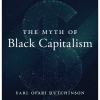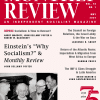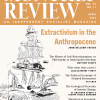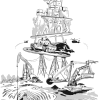
Ecosocialism and Degrowth
Originally published in the German journal Widerspruch, Arman Spéth interviews John Bellamy Foster about the growing interest in degrowth thought and the importance of incorporating democratic planning aimed at true equality into all levels of society. And what of the ecosocialist revolution? “Opportunities,” Foster says, “are everywhere. Obstacles, largely a product of the present system, are also everywhere.… Nothing can or will remain the same. That is the very definition of a revolutionary situation.” | more…

Was Karl Marx a Degrowth Communist?
Brian M. Napoletano considers the implications of recent work by Kohei Saito, in which Saito argues that Marx’s thought progressed from early productivism to middle-stage ecosocialism, and finally to degrowth communism. Napoletano concludes, that in arguing for an artificially contrived “epistemological break” between Marx’s supposed early growth-oriented perspective and his later purported “degrowth communism,” Saito fails to recognize Marx’s actual consistent emphasis throughout his work on a dialectically conceived process of sustainable human development, requiring a true social and ecological revolution. | more…

The Actuality of Red Africa
What is “Red Africa”? Through an extended treatment of Kevin Ochieng Okoth’s Red Africa: Reclaiming Revolutionary Black Politics (Verso, 2023), Vijay Prashad and Mikaela Nhondo Erskog illuminate the potential for a reinvigorated socialist politics in Africa. In turning away from Afropessimism and Decolonial Studies, the authors catalog the on-the-ground realities at play in pan-African and Marxist social movements today. | more…

The Dream of a Thing: Refounding the Economy of a Venezuelan Commune
In a vividly drawn account of El Maizal Commune, Chris Gilbert provides readers with a window into the inner workings of a community being refounded with an eye toward building a new “alternative communal economy.” The task, Gilbert finds, is one that is not only revolutionary, but liberating and creative, having the potential to collectively reimagine the social relations of a community. | more…

Is Black Capitalism Still a Myth?
The Myth of Black Capitalism, Earl Ofari Hutchinson reflects on the relevance of his work more than fifty years after its initial publication. Even despite the promotion of wealthy Black individuals as model capitalists and COVID recovery schemes purported to help Black entrepreneurs, “Little had changed except the desperation of countless numbers of near penniless, distressed Black small business owners.” | more…

May 2024 (Volume 76, Number 1)
The MR editors revisit the words of Monthly Review editors Harry Magdoff and Paul M. Sweezy, writing in the twenty-fifth-year anniversary issue. Writing on the innate contradictions plaguing the capitalist system, the editors in 1974 noted that the ecological limitations of capital accumulation was “unsolvable” under capitalism, thus setting the stage for the magazine’s continued exploration of ecosocialism as humanity’s future. | more…

Einstein’s “Why Socialism?” and ‘Monthly Review’: A Historical Introduction
For our seventy-fifth anniversary issue, John Bellamy Foster revisits the legacy of Albert Einstein and his deep connections to Monthly Review, including his authorship of the article “Why Socialism?,” published in our first-ever issue in May 1949. Through historical documents and the famed physicist’s own words, Foster rediscovers Einstein’s commitment to socialism in both word and deed, and his collegial ties to MR‘s founding editors. | more…

The Council on Foreign Relations, the Israel Lobby, and the War on Gaza
Over six months into to Israel’s atrocity-filled assault on Gaza, Laurence Shoup digs deep to reveal a rarely discussed—but enormously influential—force within the Israel Lobby: the Council on Foreign Relations. The CFR, he writes, is more than just Wall Street’s think tank; it is an elite network of Zionist politicians and donors who comprise a significant part of the Israel lobby and the continuing U.S. commitment to funding Israel’s genocidal actions in Palestine. | more…

Return of the Atlantic Route from West Africa to Europe: Imperialism and Regional (De-)Integration
As dangerous trans-Atlantic crossings between Africa and Europe continue to rise, Hannah Cross examines the roots of the ongoing crisis. The discussion around migration, she notes, “overlooks the imperial role of Europe and the United States over borders, migration regimes, regional (de-)integration, and national development projects within Africa.” The solution, therefore, can only be found through genuine liberation and autonomy across the continent, rather than internationally imposed mechanisms benefitting the powerful in the Global North. | more…

The IMF and Class Struggle in Latin America: Unveiling the Role of the IMF
The International Monetary Fund, part of the Bretton Woods Agreement that helped establish the current rules of the U.S.-dominated international capitalist system, claims to aim for a world of prosperity through so-called free trade. In Latin America, David Barkin and Juan Santarcángelo write, the IMF has contributed to the impoverishment of the working class and destruction of these countries’ ecological legacies. But what does the future hold for the IMF in Latin America? | more…
![Monthly Review Volume 52, Number 4 (September 2000) [PDF]](https://p4r4f7y4.delivery.rocketcdn.me/wp-content/uploads/2015/08/MR-052-04-2000-08-100x100.jpg)
Socialism—A Time to Retreat? The Perspective of ‘Monthly Review’ at the Opening of the Twenty-First Century
In this reprise from September 2000, Harry Magdoff, John Bellamy Foster, and Robert W. McChesney look forward to the future of Monthly Review in the twenty-first century: “Despite mistakes, setbacks, and recognition that the road is long and arduous, we must not waver as we continue to study, educate, and be missionaries for the transcendence of the social system of capitalism and the development…of a society of equals.” | more…

April 2024 (Volume 75, Number 11)
In a December 2023 interview with the Wall Street Journal, Richard Haass, former special assistant to H. W. Bush, declared that the world has descended into a “new world disorder,” lamenting the long-lost dream of unending U.S. hegemony. This month’s “Notes from the Editors” reflects on not only Haass’s recent statements, but his longstanding advocacy of an “Imperial America” designed to ensure U.S. domination on the world stage. | more…

Extractivism in the Anthropocene
This month’s Review of the Month by John Bellamy Foster illuminates the idea of extractivism, a key concept in understanding our current planetary crisis. The accelerated extraction of Earth’s resources since the mid-twentieth century, Foster notes, threatens not only the natural world, but the means of life for the entire planet. | more…